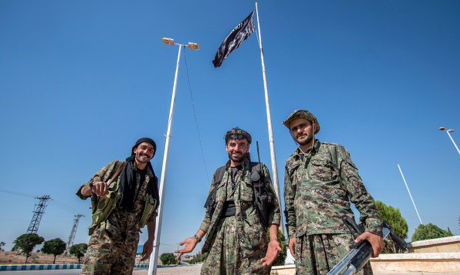
Kurdish People's Protection Units (YPG) fighters stand near an Islamic State flag in Tel Abyad town, Raqqa governorate, June 16, 2015 (Photo: Reuters)
Syrian Kurdish fighters have chased Islamic State militants from a key base north of the jihadists' stronghold city of Raqa, according to a monitoring group.
The Kurdish People's Protection Units -- with US-led air support -- took complete control of the Liwa (Brigade) 93 base on Monday, the Syrian Observatory for Human Rights said.
"IS lines of defence were pushed back to the gates of Raqa," added Rami Abdel Rahman, director of the Britain-based Observatory, which relies on a network of sources on the ground.
The base was important due to its position overlooking strategic roads linking Raqa to other IS outposts in the provinces of Aleppo to the west and Hasakah to the east. IS militants captured it from regime forces last summer.
The taking of the base is the second blow inflicted on IS fighters by the Kurds in a week, after the capture of Tal Abyad, on Syria's border with Turkey.
Tal Abyad was a key conduit for foreign fighters and supplies into IS-held territory in Syria, and for exports of black market oil from jihadist-held fields.
Kurdish forces defended the Syrian town of Kobane against IS in a months-long battle, and have emerged as some of the most effective forces battling the jihadist group in the year since it declared a cross-border "caliphate" with neighbouring Iraq.
In the northern city of Aleppo at least 10 civilians, including two children, were killed in a government barrel bomb attack on a mosque Monday, the Observatory said.
"The faithful were in the middle of the Maghrib (evening) prayers in a mosque in Aleppo's rebel-held district of Ansari," the Syrian Observatory for Human Rights said, adding that the attack also left some 20 people wounded.
The attack came just days after 70 countries united to express outrage over the regime's systematic use of barrel bombs and demand an end to the deadly, indiscriminate attacks.
Recent barrel bombings in and around Aleppo had killed hundreds of civilians and wounded dozens "with many victims blown to pieces or burnt beyond recognition," a letter to the UN Security Council said on Thursday.
The attacks were "among the most brutal perpetrated since the start of the Syrian crisis," it added, saying they were prohibited under international law and must cease.
Barrel bombs are crudely made, non-guided missiles made out of large oil barrels, gas cylinders or empty water butts, filled with powerful explosives and scrap metal to exact maximum damage.
The Syrian regime denies that the weapons exist.
Earlier Monday it was reported that the Syrian army had reopened a key oil supply route near the IS-controlled Palmyra, as the jihadist group has mined the city's ancient UNESCO-listed ruins.
"The infantry has made tangible progress in the area of Biyarat al-Gharbiyeh," west of Palmyra, which had previously been in IS hands, said pro-government newspaper Al-Watan.
The Observatory said the army was now 10 kilometres (six miles) away from Palmyra, and that President Bashar al-Assad's troops had "chased IS fighters from Biyarat al-Gharbiyeh on the weekend".
Observatory head Rami Abdel Rahman said the capture of the area "allows the regime to secure a transport route for oil from the Jazal field... to other Syrian cities under its control".
The IS group also suffered a setback in northern Iraq, where a US air strike killed a militant who was a person of interest in the 2012 attack on the US embassy compound in Benghazi, Libya.
Pentagon spokesman Colonel Steve Warren said Tariq bin al-Tahar bin al-Falih al-'Awni al-Harzi of Tunisia was killed in Mosul on June 15.
The US had described him as a "high-profile" member of Islamic State, considered one of the first people to join the group as a fighter.
Short link: